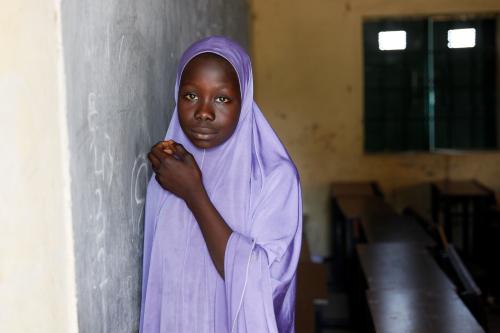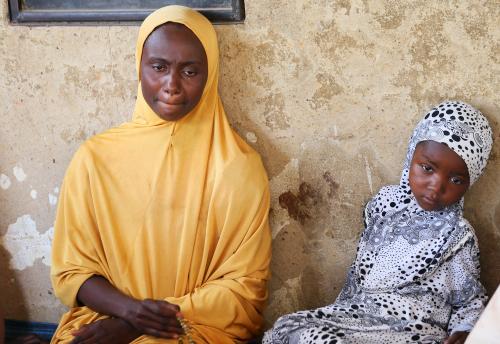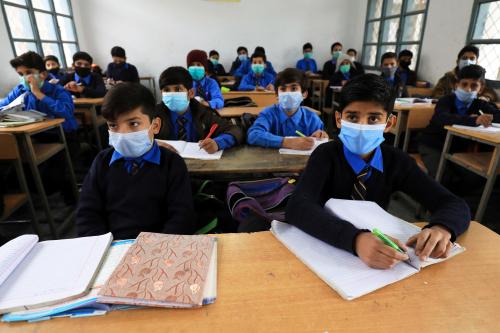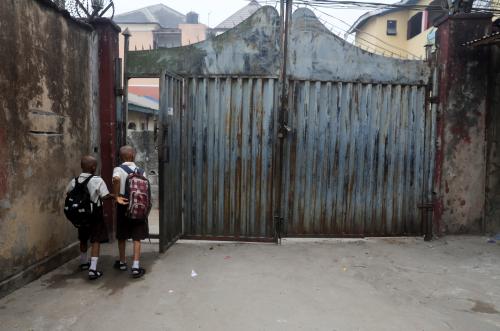Five years ago, on April 14, 2014, Boko Haram terrorists entered the Nigerian town of Chibok and kidnapped 276 schoolgirls. Already stand-outs due to their pursuit of education, these girls were exemplary in their ambition and work ethic, dreaming of a brighter future for themselves and their families. Five years later, over 100 of the young women are still missing.
Those who have returned are haunted by the nightmare they lived through and, too often, face discrimination and ostracism. Their story is not only one of personal resilience, but also of the failure of national and international institutions and the media to respond in an appropriate and timely way.
On July 31, journalist Isha Sesay joined the Brookings Africa Growth Initiative (AGI) for a discussion on her recent book, “Beneath the Tamarind Tree: A Story of Courage, Family, and the Lost Schoolgirls of Boko Haram,” which shares the personal stories of some of the Chibok girls, emphasizes the global necessity of girls’ education, scrutinizes the role of the media during such tragedies, investigates the governance challenges that persist in Nigeria, and imparts broader lessons for national security.
AGI Director and Senior Fellow Brahima S. Coulibaly opened the event, remarking on the heroism and strength of the Chibok girls: “The abduction of the Chibok girls is not just a story, it is personal, and it should be personal to all of us who value equal opportunities and equal rights for women and girls. This tragedy tells an impressive and powerful story of optimism, determination, and resilience of the abducted girls in the face of tremendous hardship.”
Moderator Travis L. Adkins, lecturer of Africa and Security Studies at the Walsh School of Foreign Affairs at Georgetown University, began the conversation by asking Sesay why she chose to write the book, to which she responded that, though the world’s attention was turned to the girls, no one ever got a sense of who they are as individuals. She wanted to share that side of the story. She said, “As much as I speak to what they went through I didn’t want to—for want of a better word—luxuriate in their agony. I didn’t want to make it so that the focus became the awfulness because that’s also to strip them again in some ways of not necessarily the agency, but the kind of dignity. And I want this book to be somewhat of a love letter to them, in a way to kind of say we see you, we know what you went through, we have some understanding of that. And so, for me it was important to bring out their strength, to bring out the ways, the very clever ways they defied their captors, and just to bring them out as rounded individuals, which just no one has—and maybe not for want of trying.”
During the event and in the book, Sesay was critical of how the Nigerian government handled the kidnapping, saying, “I think that’s one of the things that bothers me the most, the fact that these girls to this day are political pawns. These are people’s children. And just because they’re poor doesn’t mean they don’t matter. And to this day, the feeling I get from people in government, from some people in government, that they’re just a problem that some of us won’t let go. But when they were taken, Goodluck Jonathan’s wife, Patience Jonathan, said no girls had been taken, discounted the voice of Bring Back Our Girls activists … and President Goodluck Jonathan didn’t speak for almost three weeks on it. And they created this vacuum which they fed into by suggesting it was a political hoax.”
For Sesay, girls’ education is also deeply personal, as her mother in particular credits education as the reason for her success and ability to rise out of similarly humble circumstances as the young girls. Sesay emphasized, though, that despite the opportunities offered by girls’ education, as a sector meriting development support, it is still given short shrift.
“People understand that we need to educate and empower women and girls and that it has a ripple effect across a number of other metrics and areas of life. So, it’s not like governments don’t know, they know. I don’t need to sell that to them. They know the benefits. They know the benefits not just socially, they know the benefits economically if these women are empowered and get jobs and can have businesses and can look after themselves. They know in terms of life expectancy and general wellness and health in the communities. They know all of this. So, I think the issue is it’s just priorities, it’s just priorities.”








Commentary
Beneath the Tamarind Tree: Nigeria and the resilience of the Chibok Girls
August 6, 2019